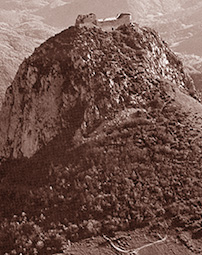
“Where is the Gral kept today? Perhaps it is kept in the depths of the heart”.
So, the pagan Gral is a carved stone, which contains the keys of wisdom of a civilization of Men-Gods, who were able to freeze time, overcoming history.
The “Holy Grail” which was searched during the Middle Age is a voluntary metamorphosis of the pagan myth. The “Stone” was transformed into the “Chalice” where the blood of Christ would have been received after He was wounded is his side by the spear, on the Cross. It was searched, through forests and mountains, by the knights of the “Round Table”, the Templars, and the pilgrims of the Middle Age.
The Cathars
We hear all the time, about the heresy of the Cathars. Who were the Cathars? They appeared in Languedoc, which today is in the south of France, during the Xth and XIth centuries. They were destroyed in the XIIIth century, during the “Albigenses Crusade”, which was organized by the Pope Innocent III, the King of France, and the monk Domingo de Guzmán. In reality, the Inquisition was created to persecute and to destroy the Cathar heresy and it was a task commissioned to the Dominican monks. By then, Languedoc maintained stronger bonds with Catalonia and Spain than with France. After the triumph of the “Albigenses Crusade”, and after a cruel and barbaric war which lasted for thirty years, Languedoc was annexed to the north of France. If those events had been different, the history of Spain would have also been different, and all the Glory of the culture of the Troubadours of Catalonia and of Languedoc would have developed.
Cathar is a Greek word meaning “pure”. To explain the –extremely unknown– origin of the Cathars would take us far away. Some argue that they once were druid priests who converted into the Manichaeism, by missionaries of Manes. Later on, they become Christians; although they were, apparently, absolute dualists in the manner of some Gnostics. They always wore a robe made of black wool, from of the Pyrenees, they believed in Reincarnation, they were strict vegetarians, and stated that the Old Testament is the work of the Devil, that Jehovah is not God, but Satan. The world, below the “Fifth Heaven”, is not the creation of God. The Earth is the work of Jehovah, the Devil. Because of this, they were not in favor of marriage or procreation that forces angelic spirits to incarnate into this world. It seems, they also accepted a kind of mystic suicide, called “endura”. The Cathars believed only in Saint John´s gospel, and claimed that Christ did not incarnate in this world of matter and that He acts only from the astral plane and that it could be actually the Archangel Gabriel instead. We only know these facts about the Cathars. Much more is the unknown. They practiced magic and they were clairvoyant. Their relation with the culture of the troubadours and the Initiation of “Pure Love”, and the “Madness of Love” is proven; there existed troubadours that openly professed Catharism.
In the south of France, in the vicinity of the beautiful medieval town of Carcassonne, the Cathars built a legendary castle: Montsegur; on the top of an elevated mountain, in accordance with astrological laws –according to Fernand Niel´s statements. Their highest priests lived there, until the fortress together with the fortified caves of the Pyrenees, fell into the hands of the Albigensian Crusade, commanded by Simon de Montfort. Everything was destroyed, everything…., except the Gral.
A German man
In 1932 an extraordinary book was published which is today almost impossible to find, but once it was translated into French, produced a huge impact to the whole area of Languedoc: Crusade Against the Grail by Otto Rahn. Its author claims that the Cathars, in the castle of Montsegur, were guarding the pagan Gral, the “Tablets of the Law” of the Aryans, of the Hyperboreans. When the castle was captured, four initiated Cathars escaped with the “treasure” and hid it inside one of the Pyrenean caves. The names of three of them are recorded in the Archives of the Inquisition of Carcassonne. The name of the fourth is unknown.




